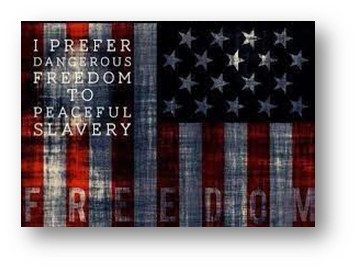“Malo periculosam, libertatem quam quietam servitutem.”
Thomas Jefferson penned those words in a letter to James Madison in 1787; a Latin phrase, translated as “I prefer the tumult of liberty to the quiet of servitude.” In his letter, Jefferson briefly examined three societal forms, concluding that a society in which this “dangerous freedom” prevails is superior to all others.

“Societies exist under three forms sufficiently distinguishable.
- Without government, as among our Indians.
- Under governments wherein the will of every one has a just influence, as is the case in England in a slight degree, and in our states in a great one.
- Under governments of force: as is the case in all other monarchies and in most of the other republics.
To have an idea of the curse of existence under these last, they must be seen. It is a government of wolves over sheep. It is a problem, not clear in my mind, that the first condition is not the best. But I believe it to be inconsistent with any great degree of population. The second state has a great deal of good in it. The mass of mankind under that enjoys a precious degree of liberty and happiness. It has its evils too: the principal of which is the turbulence to which it is subject. But weigh this against the oppressions of monarchy, and it becomes nothing. Malo periculosam, libertatem quam quietam servitutem. Even this evil is productive of good. It prevents the degeneracy of government, and nourishes a general attention to the public affairs. I hold it that a little rebellion now and then is a good thing, and as necessary in the political world as storms in the physical.”
~ Thomas Jefferson, January 30, 1787 [1]
If ever you hear the words, “This is not about your liberty or personal freedom,” you should sit up and pay special attention, for that is a sure indicator that it is most definitely about your liberty and personal freedom.
Those concepts must never be suspended. Everything must always be about them, for they are precious things. Every decision and policy must be passed through that filter and viewed through the lens of constitutionality. This is especially true in times of dire need, cultural upheaval, and national fear; for it is during those times that we are most susceptible to encroachments in the interest of perceived immediate gains of safety and security at the expense of long-term liberty.
The desperate impassioned plea of the Revolution was never “Give me liberty or give me safety.” The cry was not “Give me liberty or give me security.” The choice was liberty or death. For those who have tasted the blessings of freedom, not even fear of death can be allowed to supersede a love of liberty, for in that instant President Franklin D. Roosevelt’s words remind us that “the only thing we have to fear is fear itself.”
You are an American citizen, not an American subject. Your rights to life, liberty, and the pursuit of happiness are not granted to you by a king, a president, or a governing body. You are endowed with those “unalienable rights” by your Creator; they are not bargaining chips or leverage to be used in negotiation with your own government. Rather, for the purpose of preserving those rights “governments are instituted among men.” While history demonstrates that those rights can be trampled on by the governments of men, they can never be erased or revoked.
History is replete with examples of the inevitable outcome of negotiating with corrupt and dishonorable people. In his memoirs, Black Elk (an Ogala Sioux medicine man who was present at the Battle of Little Bighorn in 1876, and who later survived the massacre at Wounded Knee in 1890) recounts his tribe’s negotiation with the U.S. government regarding access to the sacred Black Hills, where “the Washichus had found much of the yellow metal [gold] that makes them crazy.”[2] He remembers, “They told us that they wanted only to use a little land, as much as a wagon would take between the wheels . . . and when you look about you now, you can see what it was they wanted.”[3] Black Elk recounted this memory in the sundown of his life, from his humble residence on the Pine Ridge Indian Reservation where he and his people had been herded and contained. The Indians were viewed by the government as a dirty, ignorant, and unreasonable people who refused to acknowledge “progress” and make the “right decisions” for themselves and “in the best interests of the country”; in the end those decisions were made for them, ostensibly for their own good, and they were forced to accept them. It is not the purpose here to debate the merits of Manifest Destiny, but the lesson there is worth noting: negotiating one’s freedom with corrupt, greedy, power-hungry, and dishonest people is dangerous business – give them an inch and they will take a continent.
There is a scene from C.S. Lewis’s “The Lion, The Witch, and the Wardrobe” that I find instructive in this discussion of liberty and safety. In this story, Susan expresses apprehension at finally meeting the great lion Aslan, and she asks, “Is he quite safe?” The response to this question was, I believe, profound. “Safe? Who said anything about safe? Of course he isn’t safe. But he’s good.”[4]
That is the picture of freedom and liberty I hold in my heart and in my mind. Is it safe? No. Who said anything about safe? Of course it isn’t safe; but it IS good.
Liberty cannot be preserved or even enjoyed by a fearful people. Let us dispel this spirit of fear that has gripped our land, and let us once again embrace this dangerous freedom that is ours.
[1] PTJ, 11:92-93. Letterpress copy available online at Thomas Jefferson Papers, Library of Congress. Transcription available at Founders Online.
[2] John G. Neihardt, Black Elk Speaks, (New York, MJF Books, 1961), 9.
[3] Ibid.
[4] C.S. Lewis, The Lion, the Witch, and the Wardrobe (New York, NY, Macmillon, 1950), 41-42.
